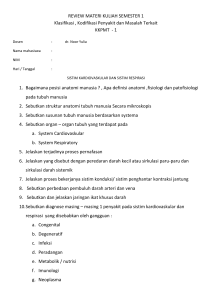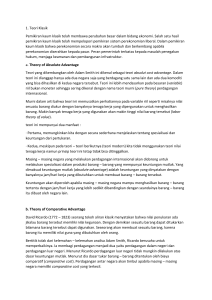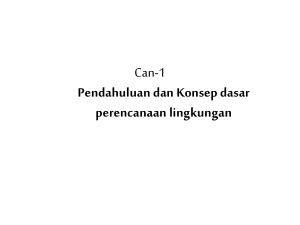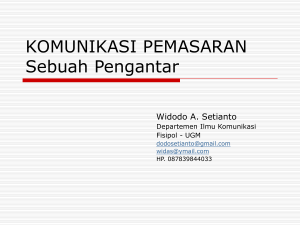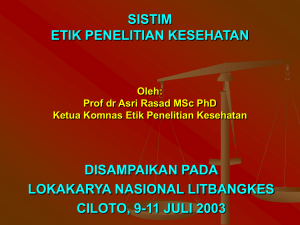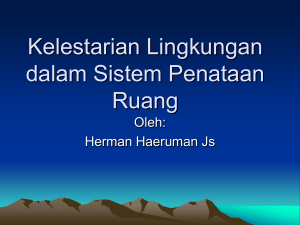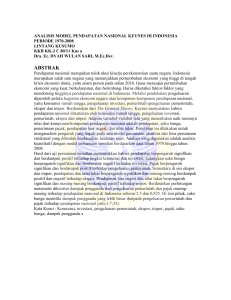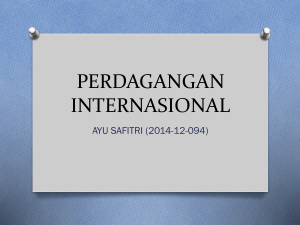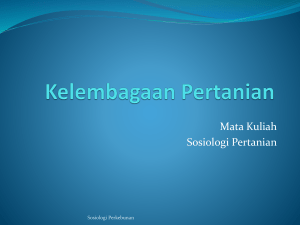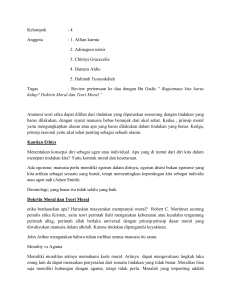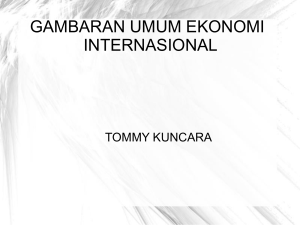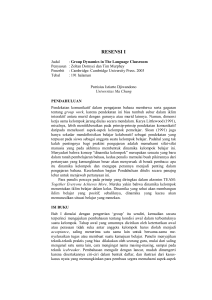Ekonomi Internasional: Perdagangan
advertisement
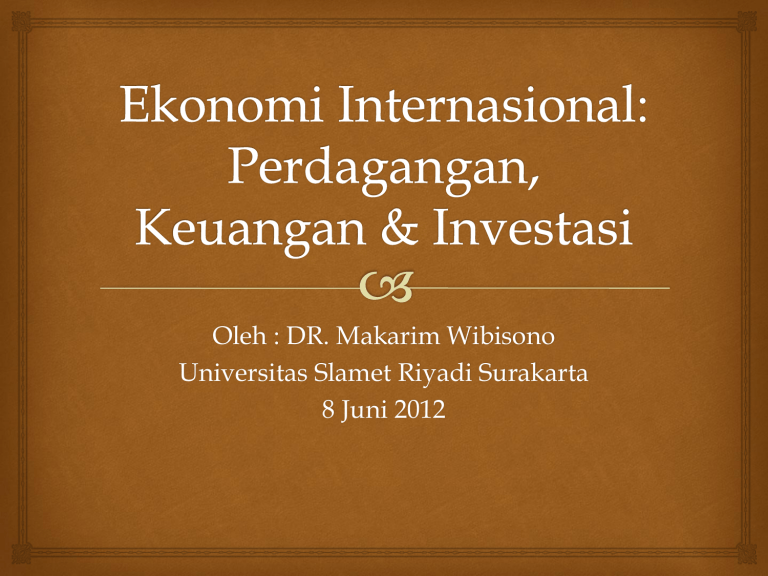
Oleh : DR. Makarim Wibisono Universitas Slamet Riyadi Surakarta 8 Juni 2012 Praktek Pelajaran Eko. Internasional: Perdagangan internasional : membutuhkan mengambil ekonomi mikro terdahulu. Aspek mikro meliputi jual beli secara internasional. Dalam ekonomi mikro mencakup faktor pasar hasil produksi dan pasar faktor produksi. Keuangan Internasional dan Investasi: membutuhkan ekonomi makro karena menyangkut masalah uang, bank dan lalu lintas modal. Bedanya dengan ekonomi nasional: Immobilitas faktor produksi: Lingkungan eksternal berbeda: • tenaga kerja, alat atau mesin serta modal. • sistim sospol, sistim ekonomi, sistim perbankan, kebudayaan termasuk bahasa. Factor endowment • berbeda sehingga harga barang juga berbeda. Perdagangan Internasional The Mercantilists : nation building David Ricardo: comparative advantage Adam Smith: free trade Faktor Proporsi (Hecksher & Ohlin) Faktor price equalization (P. Samuelson) Partial Theory The Mercantilists: Nation Building A Group of early economists called the mercantilists, who were active in the period 1500-1800. They believed that a country should always export more than it imports, thereby gaining gaining what they called “treasure”-silver and goldfrom other countries. An influx of treasure was supposed to stimulate economic activity and provide the revenue necessary to build a stronger nation. The Mercantilists preference Is defined as the difference between the value of exports and the value of imports in a specified period ( a month, quarter, or year ). By convention the BOT is said to be favorable when exports exceed imports in value. Adam Smith (1723-1790) : Free Trade He argued that the wealth of a nation would expand most rapidly if the government would abandon mercantilistic controls over domestic and foreign economic activities and permit consumers and producers greater freedom to follow their own selfinterests. Each nation would imports goods from the cheapest overseas source, and would in turn exports those products in which it had a price advantage. Liberal perspective Considerable efficiency gains arise as each nation specializes in those goods it can produce most cheaply within a system of international division of labor. Laissez-faire The principle that that government should minimize its role in the economy, confining itself to the maintenance of law and order, defense, and a few public services. Absolute Advantage Tenaga kerja yg diperlukan per unit: AS UK Gandum 8 10 Pakaian 4 2 David Ricardo: Comparative Advantage David Ricardo (1772-1823) in his “Principles of Political Economy” (1817). Even the least efficient, highestcost nation in the world could benefit from trade. Comparative Cost Hari kerja yg dipakai untuk memproduksi: Anggur (1 botol) Pakaian (1 yard) Portugis 3 hari 4 hari UK 6 hari 5 hari Portugis utk anggur 3/6 < 4/5 or 3/4 < 6/5 Inggris utk pakaian 5/4 < 6/3 or 5/6<4/3 Faktor Proporsi (Hecksher&Ohlin) Perbedaan dalam opportunity cost suatu negara dibandingkan negara lain terjadi karena adanya perbedaan dalam jumlah faktor produksi yang dimilikinya. Partial theory Perdagangan antar 2 negara terjadi karena adanya perbedaan didalam permintaan maupun penawaran. Permintaan ini berbeda misalnya , karena perbedaan pendapatan dan selera sedangkan perbedaan penawaran misalnya, dikarenakan perbedaan didalam jumlah dan kualitas faktor2 produksi, tingkat teknologi dan eksternalitas. Alternative theories Economic of Scale Production Cycle Kebijaksanaan pemerintah: Tariff Jenisnya export duties Ad valorem duties transit duties Specific duties import duties Specific ad valorem Efek dari tariff Price effect Consumption effect Protective/import susbtitution effect Redistribution effect •Perbaiki terms of trade •Infant industry •Diversifikasi •Employment •Anti-dumping • Quota : pembatasan jumlah fisik thd barang yg masuk dan keluar. • Subsidi: dari anggaran pemerintah. Perbandingan nilai atau harga antara dua mata uang yang berbeda . Hedging: utk hindari resiko fluktuasi nilai tukar Sistim nilai tukar yg berubahubah. Sistim nilai tukar (kurs) yg stabil: Stabilisasi kurs mata uang asing Standar emas Purchasing Power Parity Perbandingan nilai satu mata uang dengan mata uang lain ditentukan oleh tenaga beli uang tersebut terhadap barang dan jasa dimasing-masing negara. Gustav Cassel (Swedia) Adalah catatan yang sistematis tentang transaksi ekonomi internasional antara penduduk negara itu dengan penduduk negara lain dalam jangka waktu tertentu. Pengertian penduduk dalam BOP meliputi: Orang perorangan atau individu Badan hukum Pemerintah Persamaan Pendapatan Nasional Y = C + I + G + (X – M) Y : pendapatan nasional C : pengeluaran konsumsi I : Investasi G : Government expenditure X : Ekspor Y : Impor Investasi I = Y – C – G – (X – M) Daya tarik investasi adalah rate of return. Penanam modal adalah bukan prajurit yg pemberani, tetapi sangat penakut. Mereka sangat takut rate of return nya negatif. Peraturan nasional yg membuka akses pada FDI. Sistim nilai tukar yang konstruktif Kepemilikan tanah atau property Kepastian hukum (adanya DSM yg credible). Birokrasi yang bersih. Keserasian antara pemerintah Pusat dan Daerah.
